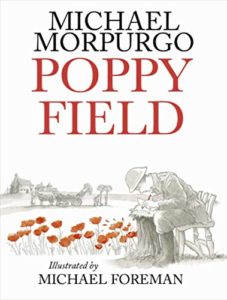“Poppy Field” by Michael Morpurgo, illustrated by Michael Foreman
 Michael Morpurgo needs no introduction as a writer and nor does the illustrator, Michael Foreman. It is a formidable creative team that has together produced some magnificent books for children in the past. Morpurgo’s stories inevitably deal with stories set in conflict zones whether set way back in the past or in the more contemporary conflicts. This time too Poppy Field focuses on World War One. It is a significant publication as 2018 marks a century since the end of The Great War. Poppy Field is about the origin of using red poppies on Remembrance Sunday and 11 November. It is as always a beautiful story told by Morpurgo that has this quality of immersing the reader in the historical fiction completely. It is done so effectively with minimal details and yet it is a brilliant recreation of the historical landscape. Unlike for adult literature where many more details are provided, in Morpurgo’s landscape there is least amount of detail provided but sufficient markers ensuring that the period of the story cannot be ever mistaken. Poppy Field is the story of four generations. The story is set in a farmland that overlooks farms and poppy fields that were the erstwhile WWI battlefields. Cemeteries and memorials still exist but they are so much a part of the landscape that the present generation barely registers their presence. Martens Markel registers their presence as he often cycles across the fields with his family to visit his father’s grave. Martens father died while ploughing their fields with a tractor that went over an unexploded shell from the war that lay buried for decades in their land. The grandfather is narrating the tale about World War One and the poppy fields to his grandson, Martens Merkel, with references to the fragile piece of paper framed in their home. The framed but crumpled sheet of paper has a poem scribbled upon it with some words scratched out. A poem that would later go on to become very well-known as John McCrue’s “In Flanders Fields”.
Michael Morpurgo needs no introduction as a writer and nor does the illustrator, Michael Foreman. It is a formidable creative team that has together produced some magnificent books for children in the past. Morpurgo’s stories inevitably deal with stories set in conflict zones whether set way back in the past or in the more contemporary conflicts. This time too Poppy Field focuses on World War One. It is a significant publication as 2018 marks a century since the end of The Great War. Poppy Field is about the origin of using red poppies on Remembrance Sunday and 11 November. It is as always a beautiful story told by Morpurgo that has this quality of immersing the reader in the historical fiction completely. It is done so effectively with minimal details and yet it is a brilliant recreation of the historical landscape. Unlike for adult literature where many more details are provided, in Morpurgo’s landscape there is least amount of detail provided but sufficient markers ensuring that the period of the story cannot be ever mistaken. Poppy Field is the story of four generations. The story is set in a farmland that overlooks farms and poppy fields that were the erstwhile WWI battlefields. Cemeteries and memorials still exist but they are so much a part of the landscape that the present generation barely registers their presence. Martens Markel registers their presence as he often cycles across the fields with his family to visit his father’s grave. Martens father died while ploughing their fields with a tractor that went over an unexploded shell from the war that lay buried for decades in their land. The grandfather is narrating the tale about World War One and the poppy fields to his grandson, Martens Merkel, with references to the fragile piece of paper framed in their home. The framed but crumpled sheet of paper has a poem scribbled upon it with some words scratched out. A poem that would later go on to become very well-known as John McCrue’s “In Flanders Fields”.
Poppy Field is a stupendous hardback picture book that will work for children and adults alike. A hundred years after the war means that few recall the reason why poppies are used remember the many soldiers who lost their lives fighting “on one side of the other, depending simply on where they were born. They fought in a huge and terrible war, the war came to end all wars they called it, which happened so long ago now that no one is old enough to remember it.” The soldiers who lie in the cemetries were born in Britain, Germany, Austria, France, Belgium, Canada, India, New Zealand, Jamaica, Australia, America. The symbolism of using a red poppy to commemorate the fallen soldiers is credited to Moina Michael of the American Legion who two days before armistice was declared read John McCrue’s poem in Ladies’ Home Journal. It moved her tremendously that she promised to “keep the faith” with the fallen American soldiers and to symbolise the promise by always wearing red poppies. The practice was carried across to the United Kingdom by a French lady called Anna Guerin who persuaded the British Legion ( formed in 1921) to have a Poppy Appeal in time for November 11th. Ever since then the red poppies have come to play a crucial role in remembering fallen soldiers not just in the two world wars but other conflicts since then. Poppies are also seen as a sign of hope — a hope that one day wars will really will stop for ever, and all the nations in the world will be reconciled and live together in peace. Poppy Field has been created in co-operation with the Royal British Legion.
Poppy Field has been published by Scholastic and is a stunning gift.
27 February 2019


